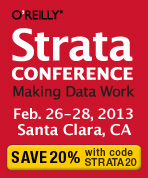Here are a few stories from the data space that caught my attention this week.
Bigger and bigger … and bigger … big data
MIT Technology Review’s business editor Jessica Leber reports this week on a conference presentation by MIT’s Andrew McAfee, wherein McAfee predicts data volumes will soon surpass the current upper bounds of metric measurement — the yottabyte. McAfee discussed in his presentation (and on his blog) how we’ve moved through the data measurement eras — terrabyte, petabyte, and soon the zettabyte … leaving us only with the yottabyte for the future. The yottabyte, Leber notes, was the largest scale of measurement scientists could imagine at the 1991 General Conference on Weights and Measures where it was established.
Leber reports that as we head into the zettabyte era, a threshold that Cisco predicts we’ll surpass by the end of 2016, McAfee predicts the General Conference on Weights and Measures will convene before the end of the decade to contemplate yottabyte’s successor. McAfee’s favorite contender prefix, Leder notes, is the “hella.”
Stacey Higginbotham at GigaOm recently covered this issue as well (I reported on it here). She reports that during a recent presentation, Intel’s Shantanu Gupta predicted the next prefixes: brontobytes and gegobytes. Higginbotham notes that the brontobyte is “apparently recognized by some people in the measurement community.”
 Strata Conference Santa Clara — Strata Conference Santa Clara, being held Feb. 26-28, 2013 in California, gives you the skills, tools, and technologies you need to make data work today.
Strata Conference Santa Clara — Strata Conference Santa Clara, being held Feb. 26-28, 2013 in California, gives you the skills, tools, and technologies you need to make data work today.
Will big data solve our health care problems?
Linda Avey, co-founder of personal genomics company 23andMe, argues in a recent video interview at the BBC that big data will be a key driving force in the future of health care. Here’s a brief excerpt from her interview:
“I believe people are going to live longer healthier lives by being able to have access to their own data as well as data that are shared through the population … I believe large data is going to be the answer to our heath problems,and until we have access to that data, we’re going to continue in the same model, which is to wait until everyone gets sick and then try to figure out what’s going on … it’s first being able to make sense of the data and the information that we can collect, but if we can start to put this out into the medical system in a way that gives tools to our doctors to keep us healthier and starts to blur the lines between who’s a dentist and who’s a doctor — it’s more about the access we have to these people and their expertise.”
Avery suggests, for instance, that in the course of a routine examination, there’s no reason why a dentist couldn’t take saliva samples and test for early signs of cancers and other diseases. You can watch Avery’s full interview at the BBC.
In related news, the Personal Genome Project Canada welcomed its first volunteer, Jill Davies, this week. Carolyn Abraham reports at the Globe and Mail that Davies will be the first to publicly release her genome, which will be placed in an open database, available for all the world to access. Davies also will provide personal context data, including her age, height, weight, medical records — basically everything except her name and address. Abraham says the Genome Project “is a deliberate effort to jump-start what has proved to be the stalled genetic revolution;” she also notes that “Canada is the only Group of Eight country without a specific law to protect the uses of genetic information.” You can read Abraham’s full report here.
Potential impact of vehicle data could be GPS big
In a post at Scientific American this week, Melissa C. Lott and Ian Kalin suggest that vehicle data could be the next genre of data to have an effect on the US economy at the scale weather and GPS data have had — they note that in 2011 alone, the total economic impact of weather and GPS data is somewhere near $100 billion. Lott and Kalin point to several indicators that may suggest this field of data is ripe for entrepreneurship, including Progressive Auto Insurance’s new SnapShot product and General Motor’s OnStar system. They also highlight a startup called Moj.io that is looking to offer a service to text parents of teenage drivers when their children exceed the speed limit while driving.
There are also savings opportunities as well, Lott and Kalin note — what if your car could tell you when it needed its oil changed rather than you following blanket recommended a maintenance schedule? Safety and fuel efficiency innovation through this type of data also is being explored through a new contest by the Department of Energy, a $50,000 Apps for Vehicles Challenge.
Lott and Kalin say that having access to one’s personal vehicle data is the most inspiring aspect — such data could help you analyze and alter your driving behavior to improve safety or to help conserve fuel, for instance. You can read their full report here.
Tip us off
News tips and suggestions are always welcome, so please send them along.
Related:
